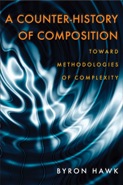A Counter-History of Composition: Toward Methodologies of Complexity
by Byron Hawk
U of Pittsburgh P, 2007, ISBN-10: 0-8229-5973-1
Reviewed by Wesley Venus, University of Georgia
| Summary | Discussion | Applicability | Pedagogy | Hopes/Desires | Conclusion(s) | Assessment | References | Notes |
Summary |
|
 |
In A Counter-History of Composition: Toward Methodologies of Complexity, Byron Hawk revisits the doctrine of vitalism as a responsive means to more conventional approaches to the topics of invention and pedagogy in composition studies. Historians of the discipline, he argues, have erroneously linked vitalism to the more mythic and genius-based characteristics of Romanticism, and for that reason many have falsely consigned its applicability to expressive-based pedagogies, where rhetoric is often presumed to be unteachable and intuitive. Hawk proposes instead that vitalism has long been a part of the rhetorical tradition, from Aristotle and through Coleridge and beyond, helpful for thinking of rhetorical invention and subject-formation in ways that are ecologically complex and suited to the digital teaching and writing contexts of the present. Because faster processing capabilities and complex user interface metaphors inform rhetorical behavior, Hawk’s book complicates the notions writers have of themselves as subjects in relation to their contexts by thinking of the rhetorical environment less dialectically (as it has recently been thought of and in many ways still is) and in a way that is more complex and adaptive.
|